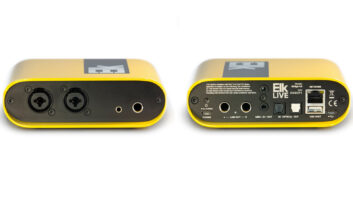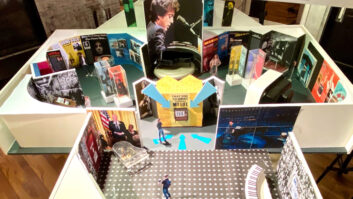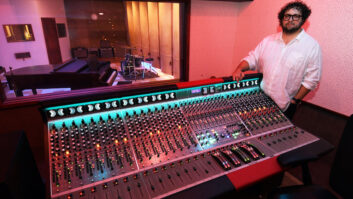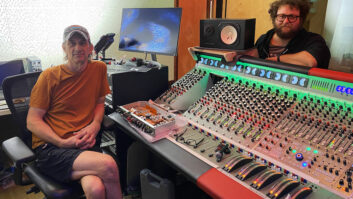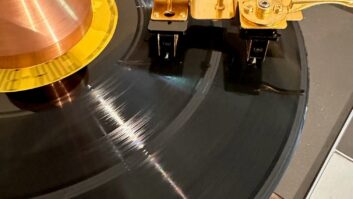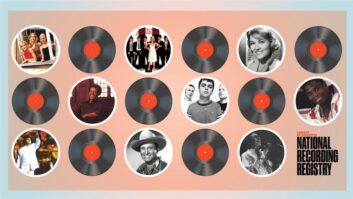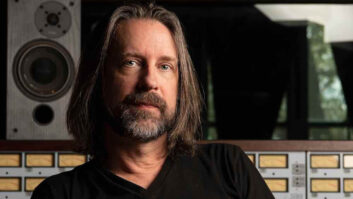Patchwerk’s live room Patchwerk Recording Studios began in 1995, conceived by Atlanta Falcons’ offensive tackle Bob Whitfield. Whitfield’s first professional gig was financing a demo for his high school chum, rapper Ras Kass. The working relationship between the two soon resulted in Ras’ first single, “Remain Anonymous,” which has since gone on to become a classic track in the urban music scene.

Spotting the potential of a highly focused commercial studio model catering to rap and urban-centered artists, Whitfield invested in a commercial recording studio located in Atlanta’s midtown section in 1995. The facility, which at the time, measured roughly 3,000 square feet and featured fully automated 48-track recording on 2-inch tape, was an instant success and attracted up-andcoming production teams, including Organized Noize, SoSoDef, La Face and many others. Now, the studio routinely hosts artists who regularly appear on the Billboard Hot R&B singles chart, while serving other genres of music as well.
Over the years, the studio was forced to expand having attracted a “who’s who” of urban recording artists over the last decade or so. Whereas Patchwerk originally began as a single-room facility, it has since expanded to three rooms in addition to a specialized mastering suite. This has enabled the facility to not only handle an increased volume of artists, but also provide mastering as a bundled or specialized a la carte service.
Patchwerk’s current COO, Curtis Daniel III, was selected by Whitfield to help manage the studio before Daniel purchased the facility in 2009 with chief engineer Mike Wilson. Wilson is an accomplished engineer who has been recognized with many Grammy awards and nominations.
“When we opened in Atlanta, everyone was still recording to tape,” recalls Wilson. “We had an early lead on the urban business, and these production teams knew what they wanted to do. Urban music was still a blossoming art form—there was New York rap, L.A. rap but no Southern rap yet.” As the studio increased in popularity, Patchwerk moved a block away from its original location to help facilitate its continued expansion. According to Wilson, this was when it evolved from a midlevel studio to one of the top studios in the Southeast.
“We wanted to be number one,” Wilson recalls. “We needed an SSL console that was better than what anyone else had. So we purchased an SSL J9000, which was their flagship console at the time. Nobody in Atlanta had one.” The new facility would not only sport a state-of-theart console, but also had enough space to accommodate several rooms. After a move that took the studio offline for just one month, a “mirror” of the original studio was set up in the front section the building, as construction began on a larger Russ Berger-designed room in the rear of the facility that would house the new SSL.
The front section of the new location opened in 1999 with the original Otari Concept console and Studer tape machine from the previous facility. Instead of “Studio A,” a rather predictable name, the new room was affectionately dubbed “Studio 995” after the address of its previous location. The room in the rear, meanwhile, was named Studio 9000 after the J-series console. Studio 9000 also sported a Quested monitoring system, chosen partly for its soft-dome tweeters. “Everyone else in Atlanta had the Augspurgers,” says Wilson. “The closest other studio that had the Quested monitors was in Chicago, where we had to travel to audition them. We wanted to be unique and not like everyone else in town.”
With so much more space and a bountiful queue of recording projects, Patchwerk had an opportunity to branch out and explore genres beyond its urban roots. “We had a huge live room now with three iso booths, so this allowed us to expand,” Wilson explains. “We began doing recordings with acts as diverse as rock bands, choirs and the Atlanta Symphony. Our large room has really allowed us to branch out well beyond just hip-hop, although this is something we are still very well known for.” With the continued success of Studio 9000, Patchwerk was once again able to invest in its equipment infrastructure and decided this time to acquire an SSL Duality for Studio 995 to accompany its Pro Tools|HD3 system.
They also created a vocal recording room adjacent to the large studio, which is able to double as a production suite. When they aren’t recording large sessions, this room can be an efficient add-on to the facility for vocal overdubs, editing and other tasks.
Patchwerk’s most recent proud achievement is the addition of a state-of-the-art mastering facility. Daniel and Wilson recruited an accomplished local mastering engineer, Kenny Mixx, who possessed experience in mastering and was also accomplished in psychoacoustics and room design. “Everyone always asked us if we did mastering, and now we can finally say, ‘Yes,’” Wilson observes. “With a full-fledged mastering operation, the experience for our clients is that much more complete. It’s all patched together.”
The mastering studio features a MAGIX Sequoia software along with a JBL monitoring system. “These monitors are very accurate, and I have done a lot of projects on them,” Mixx notes. “I also use Sennheiser HD 800 headphones for monitoring, which have a huge soundstage and have a fast attack, especially in the mids and the low end.”
More than 17 years after its opening in Atlanta, Patchwerk still has its sights set high and hopes to find even more ways to serve its customers in the future. As for the industry as a whole, Wilson would like to see better cooperation. “I want to see everyone work together. The labels need the artists, the artists need the labels, everyone needs the internet, and everyone needs to do everything to make sure the fans get what they need. If everyone works together, it is all going to be a bigger, better thing.”
Patchwerk Recording
patchwork.com
Jeff Touzeau is a regular contributor to Pro Sound News and the author of five pro-audio-related titles including, Home Studio Essentials (Cengage).

